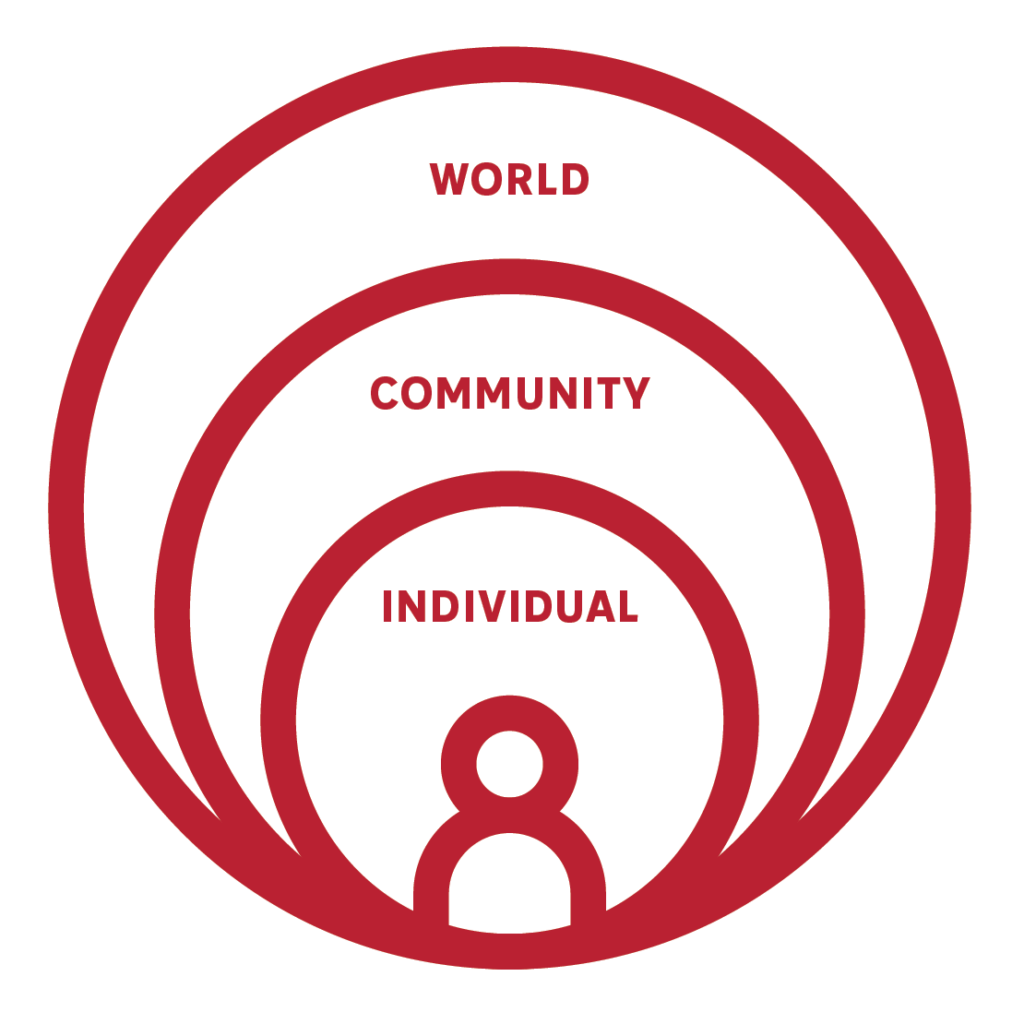
The concentric circles model of human behavior was created by the second-century Stoic philosopher Hierocles and further developed by modern psychologists. It depicts a continuum of impact in which the innermost circle ripples out into broader and broader spheres of influence – all of which, of course, are connected at the center.
In my view, it illustrates geometrically the way in which our community’s investment in WashU students reverberates beyond our campus, often extending further and wider than we could predict. It shows with simplicity and precision how, amid the complexity of our global society, WashU’s excellence in preparing principled, future-ready leaders never has been more powerful, even as higher education increasingly comes under scrutiny in public discourse.
If we are to address global challenges – and we must – first, we must open the university’s doors wide to all qualified students, regardless of socioeconomic status, and better equip them to thrive once here. Changing the world begins with empowering our students. This is why, since I became WashU’s 15th chancellor nearly five years ago, we have made a series of institutional commitments to them:
- In fall 2019, we announced the WashU Pledge, which provides a free undergraduate education to full-time students from Missouri and southern Illinois who are Pell-Grant eligible or from families with annual incomes of $75,000 or less.
- In fall 2021, we launched Gateway to Success, a new need-blind policy which eliminated the ability to pay as a factor in undergraduate admissions decisions, while also significantly augmenting financial aid for graduate and professional students.
- In fall 2022, we launched Make Way: Our Student Initiative, a major fundraising effort that removes barriers for promising students by building resources for undergraduate scholarships, graduate scholarships and fellowships, and a best-in-class student experience.
- This fall, we launched a new no-loan undergraduate financial aid policy that replaces federal loans with scholarships and grants in undergraduate students’ financial aid packages.
I initiated each of these commitments without hesitation because, in each instance, it was the right thing to do. Equity and inclusion are fundamental to our institutional mission. As such, we have a moral obligation to do what we can to address a twofold challenge: the rising cost of higher education and the growing importance of a college degree.
We have an obligation to make WashU more accessible and affordable in the context of a rapidly changing, modern innovation economy that increasingly requires the completion of a college degree to enable sustainable, family-supporting careers. A high school diploma just doesn’t hold the economic currency that it did 70 years ago. And we must ensure that students and families don’t face long-term, life-limiting debt as the trade-off for pursuing a life-changing education. Moreover, we must continue to invest in the excellence of our student body by admitting the brightest and most talented students based on personal and academic merit, irrespective of the ability to pay.
Relying primarily on our endowment is the best financial model to sustain this progress. To maintain our growing levels of socioeconomic diversity and to match our students’ tremendous caliber with an unparalleled educational experience, we must continue to substantially grow our endowment resources. To sustain the no-loan policy alone in the long term, we must raise more than $325 million for undergraduate scholarships for the endowment by June 2028.
Today, more than 50% of undergraduate financial aid per year comes from our operating budget. This constrains our ability to capitalize on new opportunities and address unexpected challenges. Equally important, it limits our capacity to bolster existing academic programs and research. Investing in these areas allows us to remain competitive with our peer institutions.
I remain hopeful about our ability to balance these different strategic priorities and their required resources. With an eye to the future shaped by my appreciation for all that has brought us here, I am so grateful for the generosity and loyalty of WashU’s global network of alumni and friends. These relationships are part of our institutional DNA. We could not have built this university without them; neither can we sustain our ambitious strategic goals without their continued support. Our financial model of proactive philanthropic partnership, with a focus on our endowment, is a major strength that has stood the test of time.
I have strong faith in the dedication of our university community and the willingness of our alumni and friends to step up and give what they can to pay their success forward, beginning where they are. When we focus on what we can accomplish together, the future looks promising. As we home in on the center of things – our students – we will come full circle to achieve our goal of world-changing impact.